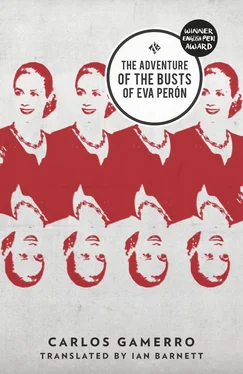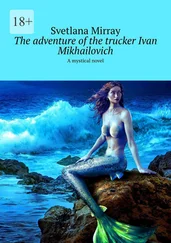Carlos Gamerro - The Adventure of the Busts of Eva Perón
Здесь есть возможность читать онлайн «Carlos Gamerro - The Adventure of the Busts of Eva Perón» весь текст электронной книги совершенно бесплатно (целиком полную версию без сокращений). В некоторых случаях можно слушать аудио, скачать через торрент в формате fb2 и присутствует краткое содержание. Год выпуска: 2015, Издательство: And Other Stories, Жанр: Современная проза, на английском языке. Описание произведения, (предисловие) а так же отзывы посетителей доступны на портале библиотеки ЛибКат.
- Название:The Adventure of the Busts of Eva Perón
- Автор:
- Издательство:And Other Stories
- Жанр:
- Год:2015
- ISBN:нет данных
- Рейтинг книги:3 / 5. Голосов: 1
-
Избранное:Добавить в избранное
- Отзывы:
-
Ваша оценка:
- 60
- 1
- 2
- 3
- 4
- 5
The Adventure of the Busts of Eva Perón: краткое содержание, описание и аннотация
Предлагаем к чтению аннотацию, описание, краткое содержание или предисловие (зависит от того, что написал сам автор книги «The Adventure of the Busts of Eva Perón»). Если вы не нашли необходимую информацию о книге — напишите в комментариях, мы постараемся отыскать её.
Carlos Gamerro's novel is a caustic and original take on Argentina's history.
The Adventure of the Busts of Eva Perón — читать онлайн бесплатно полную книгу (весь текст) целиком
Ниже представлен текст книги, разбитый по страницам. Система сохранения места последней прочитанной страницы, позволяет с удобством читать онлайн бесплатно книгу «The Adventure of the Busts of Eva Perón», без необходимости каждый раз заново искать на чём Вы остановились. Поставьте закладку, и сможете в любой момент перейти на страницу, на которой закончили чтение.
Интервал:
Закладка:
What an orator, thought Marroné to himself, looking up for a minute at the closed cubicle door. It wasn’t your run-of-the-mill campaign speech, a mere rhetorical exercise; it was Public Speaking and Influencing Men in Business by Dale Carnegie incarnate. Cold intelligence could make many a specific objection to Evita’s words, but the heart was overpowered by them. That was the touchstone of a good speaker: when they managed to convey their passion even to those who didn’t agree with their ideas. ‘Touching people’s hearts,’ Marroné said to himself, ‘is not the same as shaping their minds, but it’s definitely a step in the right direction.’ The formula sounded so apt that he vowed to jot it down in quotation marks, with his name at the side in brackets, in his notebook of famous quotes and phrases.
Allies of imperialism, the military and the oligarch traitors interpreted Perón’s prudence and Evita’s self-denial as weakness and launched their first coup, thwarted by the swift mobilisation of the people, who once again poured into the square to defend their leader. But Evita had understood that the presence of the people on the streets wasn’t enough. She didn’t want her descamisados to go like lambs to the slaughter. As well as being mobilised, the people had to be armed . And there she was again, in work clothes, hair loose, like a young guerrilla, examining a 9mm pistol that she had picked up from a table covered in an impressive array of hardware, remarking, ‘ With these in the hands of my descamisados, the oligarchs will shit their pants ,’ while the box read: 5,000 automatic pistols and 1,500 machine guns bought with money from the Foundation, the first weapons of the Peronist People’s Army, to be delivered to the workers to defend Perón and his government . Had these weapons reached their destination, Argentina’s recent history would have been very different: Perón wouldn’t have been overthrown by the Liberating Revolution, no exile or firing squads, no torture or murder of popular militants and workers’ leaders… But, working tirelessly and frantically, sometimes sleeping no more than two or three hours a night, as if wanting in just a few short years to compensate the poor for more than a hundred of suffering, attending only to the needs of her descamisados, Evita has neglected her own, and the cancer prayed for by the oligarchy, and lamented so bitterly by her people, has now taken possession of her body … Evita was now in her sickbed, receiving a group of five children, including the urchin from Los Toldos, and as she spoke you could see they drank in her every word: ‘ Just one thing I ask of you today, children: that you promise to defend Perón and fight for him to the death . When I am no longer here, you will have to take my place: you will be the bridge between Perón and the people, you will be the eternal watchmen of the Revolution, for you are my heirs , and in the next picture, the five children, now grown up and with rifles in their hands, never forgot Evita’s message; and today wherever there’s a child crying for food, wherever there’s a worker fighting against exploitation, wherever there are people fighting for their liberation, there will always be a Montonero .
Once Evita was dead , the text proceeded rather more demurely, she was handed over to the Spanish embalmer, Dr Pedro Ara, so that that she would live on in soul and body too; so that, like Joan of Arc, she would be there to guide us in the struggle against foreign domination . The photo showed Evita in silhouette, covered by a shroud, while a bald Dr Frankenstein in white coat and glasses contemplated the maiden from Los Toldos — his masterpiece. After the funeral, which lasted a fortnight, during which the sky came out in sympathy with the dispossessed, accompanying their outpourings of grief with persistent drizzle , the body was deposited in the General Confederation of Labour building, where it lay patiently awaiting the erection of the Monument to the Descamisado, which will be the tallest in the world at twice the height of the Statue of Liberty, and will contain a silver sarcophagus, the permanent resting place for her mortal remains.
He smiled when he came across his old friend, the Descamisado of the Monument. His and Evita’s paths crossed at every turn, in every box. The next few showed archive footage of the military’s bombardment of Plaza de Mayo, of the coup that ousted Perón and of the iconoclastic fury unleashed by the anti-Peronists on effigies of Perón and Evita, and here again Marroné’s and Evita’s paths crossed. For, having been born at the height of the Perón administration, he well remembered the pompier portraits of the President and First Lady in the school entrance hall, by the dark wood panelling that listed in gold lettering the ‘Dux Medallist Boys’; he effortlessly recalled the opening phrases of his first reading book (‘Eva… Evita… Evita looks at the little girl… the boy looks at Evita… Perón loves children’) and the bust of Evita that presided over the school’s playground — an Evita with a plaited bun, mounted on a polished black marble pedestal, which they used as a base for tag or hide-and-seek. But suddenly one day — he must have been in third or perhaps fourth grade — he saw the mistresses, masters, headmaster and directors all kissing and hugging, and where the portraits of Perón and Evita had been, there now hung a portrait of the Queen, and they had new reading books, and there was no sign of the bust of Evita, not even of its pedestal: it had been removed, and the hole hastily filled with new flagstones, as if to erase every trace of her existence. And so it had been in every school, in every public office, in every hospital, police station and town square. Hundreds, perhaps thousands of busts of Perón and Evita delivered up to the fury of sledgehammers, pickaxes and iron bars: ears gone, noses gone, cloven in two, heads rolling with all the zeal of the French Revolution.
Just then a dull murmur reached his ears, muffled and powerful as the roar of the stadium on matchday. For a moment he thought his imagination had conjured up the roar of the people wailing for Eva’s return, but after listening hard for a few seconds the sound had only increased, so, pulling up his overalls in resignation, he flushed the toilet and the water washed his weak pee away — the sole tangible result of all his straining — and poked his head out of the office’s inner window. The sound came from the factory: it was the corrugated iron roof clattering and rattling in the falling rain. At that moment a bolt of lightning lit up windows and skylights, and a second later the first clap of thunder shook the whole structure, which, like a huge metal drum, went on vibrating for some time. He went out into the main corridor and caught the first gust of fresh air full in the face as it came in through the open window; he thrust his hands and arms outside, and felt the icy water and the gentle pattering of a few small hailstones, which melted on his palms as he watched; then, lifting his hands to his face, he freshened his forehead, his neck, his ears, his tired eyes. The rain washed the snow-covered gardens, which appeared less white and more green by the lightning, their coat of plaster trickling away through the blades of grass, and flowing in milky streams down ditches and paths.
Watching the rain, Marroné lost himself the way others lose themselves in the immensity of the sea or the depths of a log-fire. Something had changed in him — something was still changing in him — after reading the photonovel of Evita’s life. ‘It’s just another order,’ he had snapped at Paddy, believing it to be true. ‘They mean nothing to me; they’re just mass-produced busts,’ he had added, cursing his bad luck. But what if it wasn’t just a question of luck, good or bad? What if there was a reason for him to get involved in the strike? At times his mind’s eye caught flashes of a secret design, but for the moment all he could make out were a few loose ends. Could that be what Paddy had been trying to get across? He, Marroné, had marched in and ordered the busts like someone buying a dozen pastries — and from an oligarch exploiter no less. No, the busts of Eva couldn’t come from the hands of dissatisfied, exploited workers: that was the lesson. They could only come from the hands of the satisfied, well-remunerated, well-treated working class… of happy descamisados. The busts of Eva couldn’t be bought; they had to be earned. They would be his when he had learnt to be worthy of them.
Читать дальшеИнтервал:
Закладка:
Похожие книги на «The Adventure of the Busts of Eva Perón»
Представляем Вашему вниманию похожие книги на «The Adventure of the Busts of Eva Perón» списком для выбора. Мы отобрали схожую по названию и смыслу литературу в надежде предоставить читателям больше вариантов отыскать новые, интересные, ещё непрочитанные произведения.
Обсуждение, отзывы о книге «The Adventure of the Busts of Eva Perón» и просто собственные мнения читателей. Оставьте ваши комментарии, напишите, что Вы думаете о произведении, его смысле или главных героях. Укажите что конкретно понравилось, а что нет, и почему Вы так считаете.











